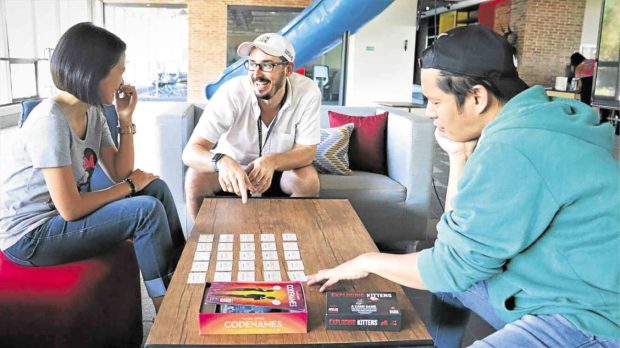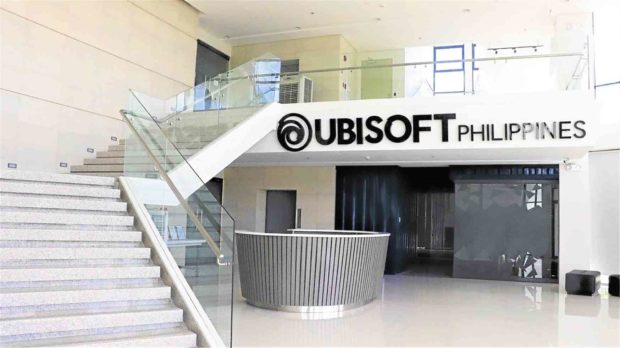Seriously fun
Inside the new game development studio of Ubisoft Philippines, a slide in the middle of the workplace seems hardly an unusual fixture—the company, after all, is in the business of fun.
“We’re serious about having fun, and we’re also serious about making fun,” says Chip Go, studio manager of Ubisoft Philippines. “It’s a profession—you have to be professional, to improve your craft.”
The 2,000-square-meter, three-level facility inside the De La Salle University Science and Technology Complex (the university’s campus in Sta. Rosa, Laguna), also has game stations, a dedicated pantry for each floor (with unlimited coffee!), breakout spaces/lounge areas, and even a ping pong table. The rooftop is reserved for special events and regular barbecues.
The slide, in case you’re wondering, connects the second floor to the first, so one doesn’t have to take the stairs or wait for the elevator (it’s a slippery slope, so use your feet to “brake” as you go down, says Sylviane Bahr, communications director of Ubisoft Singapore, Chengdu, and Philippines).
The whole idea behind the studio’s location and design is to provide employees with an environment that fosters creativity and collaboration, says Go. Duke Sage, principal architect of The Sage Group Asia, says they designed the workspace based on two things: approachability and trust.
Article continues after this advertisement“[Go] explained to me that they wanted to be more approachable to the staff. They wanted to minimize partitions that would delineate top management from them,” says Sage.
Article continues after this advertisementThe studio is also unmistakably Filipino—each floor has a theme based on our country’s regions. First floor is Luzon; second, Visayas; and third, Mindanao. Sage says they also worked in Ubisoft’s video-game characters into each level’s design to truly give the studio a signature look.
Ubisoft Philippines currently has a team of 100 game developers, who, in just two years of operations—then in a smaller office still inside DLSU Laguna—codeveloped five AAA Games (classification term for high-quality games): “Assassin’s Creed: Odyssey;” “Assassin’s Creed: Origins;” “The Crew 2;” “For Honor;” and “Skull & Bones.”
“Codevelopment means we work with different studios all around the world. That’s one flavor unique to the brand,” says Go.
Go says that with the new and bigger facility, the company is also looking to increase their workforce to at least 250 in the coming years. Current openings include those for artists, programmers and project managers.

Formal and informal spaces blend seamlessly inside Ubisoft Philippines, creating an environment that fosters creativity and collaboration. A slide connects the second and first floors.
“The talents will dictate how fast we grow. Right now it’s important that we find the right people who have the skills, the culture, the passion,” says Go. “We want to fill this up, but we want to take it step by step.”
Those lucky enough to be accepted into Ubisoft Philippines will undergo training for three to six months, depending on their position. It’s part of the company’s investment in the people, says Go, whether they’re experienced professionals or fresh graduates.
As their educational partner, DLSU’s Laguna campus will also be one of Ubisoft Philippines’ sources of talent, especially since the university offers a degree in Game Development.
“Instead of just being close to the [gaming] industry, we have the industry inside our campus itself,” says Robert Roleda, DLSU chancellor. “Ubisoft will provide us the know-how in world-class development, something that the Philippines has never seen before.”
Ubisoft Philippines also supports the IT education of underprivileged college students in Cebu, Go’s hometown, through nongovernment organization Passerelles Numeriques. The company currently sponsors 10 students who are expected to graduate next year.
“The thrust of Passerelles Numeriques is to help them in their education so they can be independent,” says Go. “I really believe that education is a universal human right.”
As Ubisoft Philippines continues on its mission to create more high-quality games for its community, Go says he is confident about hitting their growth targets particularly because of the characteristics unique to Filipinos working in the industry.
“[We’re] creative, attuned to technology, we’re proficient in English—and we’re gamers! It’s important that you love what you do, and you have to know what good looks like,” he says.
“The positivity and the dedication that we see here really allows us to push boundaries to make things possible,” adds Hugues Ricour, managing director of Ubisoft Philippines and Ubisoft Singapore. “The can-do attitude, the smile and the togetherness are really what makes this studio unique.”
